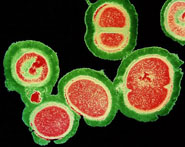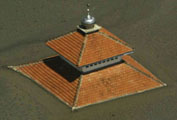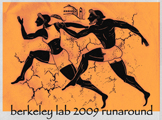


[New York Times] Dr. Alexander Khoruts had run out of options. He took on a patient suffering from a vicious gut infection of Clostridium difficile (pictured). Khoruts treated her with an assortment of antibiotics with no success. He decided his patient needed a transplant, so he gave her some of her husband’s bacteria using a procedure known as bacteriotherapy or fecal transplantation. Khoruts and his colleagues took a genetic survey of the bacteria in her intestines before the transplant. Two weeks after the transplant, the scientists analyzed the microbes again. Her husband’s microbes had taken over. “That community was able to function and cure her disease in a matter of days,” said Janet Jansson, a microbial ecologist at Berkeley Lab who co-authored a research paper with Khoruts. “I didn’t expect it to work. The project blew me away.” More>
 Carbon Smackdown: Urban Wind Turbines Topic of Friday Event
Carbon Smackdown: Urban Wind Turbines Topic of Friday Event The third of five Carbon Smackdown matches takes place Friday at noon in the Building 50 Auditorium. Grab your lunch and learn how Berkeley Lab scientists are developing wind turbines to be used in an urban setting, as well as analyzing what it will take to increase the adoption of wind energy in the U.S. Glen Dahlbacka of the Accelerator & Fusion Research Division and Ryan Wiser of the Environmental Energy Technologies Division will also answer your questions. Can’t leave your desk at noon? We’ve got you covered with a live webcast. The two previous smackdown lectures are archived there as well. Check out the complete line-up of matches pitting Berkeley Lab scientists against carbon dioxide.
 [Los Angeles Times] The Lusi mud volcano spread is so relentless — burping noxious gas, swallowing communities, killing 14 people and forcing the evacuations of 60,000 — that some say it could star in its own sci-fi thriller. Indonesian officials have insisted that it was the result of a an earthquake that struck 175 miles away just before the mud began its onslaught in 2006. But evidence from a team of independent U.S. and British geologists — including Berkeley Lab earth scientist Michael Manga — suggests that the mud volcano, like the British Petroleum oil disaster, was man-made, the result of a 2006 drilling accident at a nearby gas exploration site. More>
[Los Angeles Times] The Lusi mud volcano spread is so relentless — burping noxious gas, swallowing communities, killing 14 people and forcing the evacuations of 60,000 — that some say it could star in its own sci-fi thriller. Indonesian officials have insisted that it was the result of a an earthquake that struck 175 miles away just before the mud began its onslaught in 2006. But evidence from a team of independent U.S. and British geologists — including Berkeley Lab earth scientist Michael Manga — suggests that the mud volcano, like the British Petroleum oil disaster, was man-made, the result of a 2006 drilling accident at a nearby gas exploration site. More>
 Employee Activity: See Your Artwork on This Year's Runaround T-Shirt
Employee Activity: See Your Artwork on This Year's Runaround T-Shirt With the 33rd Runaround, the Lab's annual fun race, just a few months away, the Employee Activities Association is now making preparations. Among them is the contest for the Runaround t-shirt design. Submissions are now being accepted and can be sent here as a JPEG or PDF file. Be sure to include your employee and phone numbers, as well as a brief description of the design. Deadline is Friday, Aug. 20, with the winner announced in late September. Pictured is last year's winning design by Serafin Colmenares from the Department of Genome Dynamics.
Yesterday’s edition of Today at Berkeley Lab listed the incorrect date for the visit by a Costco representative. The event takes place next Tuesday, July 20, from 11 a.m. to 1 p.m. in the cafeteria lobby. Lab ID is required for membership application.
Employees at the Lab who use the Rockridge shuttle bus are asked to take a quick, two-minute survey on the line’s departure times. Go here to take the survey. For more information, contact Tammy Brown (x5232)..
Starting tomorrow, employees are requested to place all new orders for liquid helium with Airgas NCN. Airgas has agreed to supply Berkeley Lab with highly competitive prices for liquid helium in dewars. Users are requested to shift their purchases to Airgas (new subcontract 6929067), as the Matheson Tri-Gas B2B has ceased. Airgas can be reached at (800) 336-4004, or contact Terry Pierre (x6067) for more information.
Today
at Berkeley Lab encourages feedback and story ideas
Deadline for submissions is 10 a.m. two days prior to publication
TABL is produced by Public Affairs' Communications Group